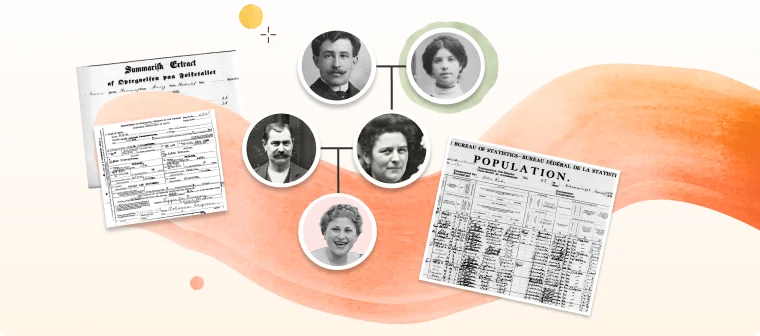Name Directory by Last Name: Last Names Starting with Va
Explore millions of names to discover rich genealogical details and uncover your family's history
Enter a name to research
Last name meanings and origins
- Vaughan
The surname Vaughan has its historical roots in Wales, deriving from the Welsh word "bychan," meaning "little" or "small." It first appeared in the medieval period, with records dating back to the 12th century. The name was often used as a patronymic, indicating descent from a person named Bychan, and it became associated with various noble families in Wales.
- Vaughn
The surname Vaughn has its historical roots in Wales, deriving from the Welsh word "bychan," which means "little" or "small." It is often considered a diminutive form of the name "Vaughan," which has been recorded since the 12th century. The surname likely emerged as a way to denote a younger or smaller individual within a family or community, reflecting a common practice in Welsh naming conventions.
- Varga
The surname Varga has its roots in Hungary, deriving from the Hungarian word "varga," which means "cobbler" or "shoemaker." This occupational surname likely emerged in the medieval period, when surnames began to be adopted based on trades and professions. The earliest records of the surname can be traced back to the 13th century, particularly in regions of Hungary where cobblers played a vital role in local economies.
- Vance
The surname Vance has its historical roots primarily in Scotland, where it is believed to have originated from the Gaelic name "Mac a' Bhainse," meaning "son of the white one." The name is thought to have first appeared in the 13th century, particularly in the region of Fife. Over time, the Vance surname became associated with various occupations, including farming and landholding, reflecting the agrarian lifestyle of early Scottish society.
- Valentine
The surname Valentine has its roots in the Latin name "Valentinus," which means "strong" or "healthy." It first appeared in historical records during the early medieval period, particularly in regions of Europe such as France and England. The name became popular due to the veneration of Saint Valentine, a Christian martyr whose feast day is celebrated on February 14.
- Vasquez
The surname Vasquez has its historical roots in Spain, particularly in the region of Castile. It is a patronymic surname derived from the given name "Vasco," which itself is derived from the Latin "Vasconis," referring to the Basque people.
- Vanderbilt
The surname Vanderbilt has its roots in the Dutch surname "Van der Bilt," which translates to "from the farm" or "from the estate." The name is believed to have originated in the Netherlands, with early records dating back to the 17th century. The Vanderbilt family rose to prominence in the United States during the 19th century, particularly through the efforts of Cornelius Vanderbilt, who made his fortune in shipping and railroads.
- Van Buren
The surname Van Buren has its historical roots in the Netherlands, specifically deriving from the Dutch phrase "van Buren," which translates to "from Buren." This name likely originated as a toponymic surname, indicating that the bearers hailed from a place called Buren, a town in the province of Gelderland. The surname first appeared in records during the late Middle Ages, around the 16th century, and was associated with the social and economic structures of the time, where surnames often reflected geographical origins or occupations.
- Vazquez
The surname Vazquez has its roots in the Iberian Peninsula, particularly in Spain, where it is derived from the given name "Vasco," which itself is of Basque origin, meaning "from the Basque Country." The suffix "-ez" indicates "son of," thus Vazquez can be interpreted as "son of Vasco." This patronymic naming convention became prevalent in Spain during the Middle Ages, particularly in the 12th century, as a means of identifying lineage. Historically, individuals bearing the surname may have been associated with various occupations, including farming, trade, and military service, reflecting the agrarian and feudal society of the time.
- Valdez
The surname Valdez has its historical roots in Spain, particularly in the region of Castile. It is derived from the Spanish word "valdez," which is believed to mean "valley" or "dweller in the valley," indicating a geographical connection to the landscape where the original bearers of the name lived.
- Van Dijk
The surname Van Dijk has its origins in the Netherlands, deriving from the Dutch words "van," meaning "from," and "dijk," which translates to "dike" or "dyke." This indicates a geographical origin, likely referring to individuals who lived near or were associated with a dike, a crucial feature in Dutch landscape management, especially in areas prone to flooding. The surname first appeared in historical records during the late Middle Ages, around the 14th century, as the Dutch began to adopt hereditary surnames.
- Van Den Berg
The surname Van den Berg has its roots in the Netherlands, where it is a toponymic surname derived from the Dutch words "van" meaning "from" and "den berg" meaning "the mountain" or "the hill." This indicates that the original bearers of the name likely lived near a notable geographical feature, such as a hill or mountain. The surname first appeared in the medieval period, with records dating back to the 14th century.
- Van
The surname Van has its roots in the Dutch and Flemish regions, where it is often used as a prefix meaning "from" or "of," indicating geographical origin. Historically, it was commonly associated with noble families or landowners, signifying their connection to a particular place or estate.
- Varney
The surname Varney has its historical roots in England, with origins that can be traced back to the Norman Conquest of 1066. The name is believed to derive from the Old French personal name "Varnay," which itself is thought to be linked to the word "verne," meaning "alder tree." This connection suggests that the early bearers of the surname may have lived near or worked with alder trees, which were common in wetland areas.
- Vallee
The surname Vallee has its roots in the French language, deriving from the word "vallée," which means "valley." Historically, it is believed to have first appeared in France, particularly in regions characterized by valleys and low-lying areas. The surname likely developed as a topographical identifier for individuals or families living in or near such geographical features.
- Vail
The surname Vail has its historical roots in England, deriving from the Old French word "val," meaning "valley." It is believed to have first appeared in the medieval period, particularly in the 12th century, as a topographical surname for individuals who lived near or in a valley. Over time, the name evolved, with variations such as Vale and Vailes emerging, reflecting the geographical features of the landscape where the bearers resided.
- Valenzuela
The surname Valenzuela has its historical roots in Spain, particularly in the region of Andalusia. It is derived from the Spanish word "valenzuela," which is a diminutive form of "valencia," meaning "strength" or "valor." The name likely originated as a locational surname, referring to individuals from places named Valenzuela, which can be found in various parts of Spain.
- Valentin
The surname Valentin has its roots in the Latin name "Valentinus," which means "strong" or "healthy." It first appeared in historical records during the early Middle Ages, particularly in regions influenced by the Roman Empire. The name became popularized through the veneration of Saint Valentine, a Christian martyr whose feast day is celebrated on February 14.
- Vale
The surname Vale has its historical roots primarily in England, where it is believed to have originated from the Old French word "val," meaning "valley." This suggests that the name may have been used to denote someone who lived near or in a valley, reflecting the geographical features of the landscape. The surname first appeared in written records during the medieval period, with variations such as de la Vale or de Vale indicating noble lineage or land ownership.
- Varner
The surname Varner has its historical roots primarily in the Germanic and Anglo-Saxon regions, with its earliest appearances traced back to the medieval period. The name is believed to derive from the Old High German word "farna," meaning "to travel" or "to journey," which may suggest that the original bearers of the surname were involved in occupations related to travel or trade.
- Valencia
The surname Valencia has its roots in the Latin word "Valentia," meaning "strength" or "valor." It is derived from the ancient Roman city of Valencia, founded in 138 BC in present-day Spain. The name began to appear in historical records during the Middle Ages, particularly in the Iberian Peninsula, where it was associated with noble families and landowners.
- Valentino
The surname Valentino has its roots in Italy, deriving from the Latin name "Valentinus," which means "strong" or "healthy." The name first appeared in historical records during the early Middle Ages, particularly associated with the Christian martyr Saint Valentine, whose feast day is celebrated on February 14. As a given name, Valentinus became popular in various regions of Italy and eventually evolved into a surname.
- Vachon
The surname Vachon has its historical roots in France, particularly in the region of Normandy. It is derived from the Old French word "vachon," which means "cowherd" or "herdsman," indicating that the original bearers of the name were likely involved in cattle herding or farming.
- Vasques
The surname Vasques has its historical roots in the Iberian Peninsula, particularly in Spain and Portugal, where it is believed to have originated during the Middle Ages. The name is derived from the given name "Vasco," which itself is of Basque origin, meaning "the one from the Basque Country." The surname likely emerged as a patronymic, indicating "son of Vasco," and it became associated with various occupations, particularly in agriculture and trade, as families settled in different regions.
- Van Leeuwen
The surname Van Leeuwen has Dutch origins, tracing back to the Netherlands, where it first appeared in the late Middle Ages. The name itself translates to "from the lion," with "leeuwen" being the plural form of "leeuw," meaning lion in Dutch.
- Varley
The surname Varley has its historical roots in England, particularly in the northern regions, where it is believed to have originated from the Old Norse personal name "Vǫrðr," meaning "guardian" or "watchman." The name likely first appeared in the medieval period, with records dating back to the 13th century. Varley may have been associated with specific occupations, such as those involved in land management or guardianship roles, reflecting the social structure of the time.
- Valle
The surname Valle has its historical roots in the Latin word "vallis," meaning "valley." It is believed to have originated in the Iberian Peninsula, particularly in Spain, where it first appeared in the medieval period. The surname likely developed as a topographical name for individuals who lived near or in a valley, reflecting the geographical features of their surroundings.
- Van Horn
The surname Van Horn has its historical roots in the Netherlands, particularly in the region of Holland. It is a toponymic surname, derived from the Dutch words "van," meaning "from," and "horn," which refers to a geographical feature, often a horn-shaped promontory or a place name.
- Vann
The surname Vann has its historical roots primarily in England and is believed to derive from the Old English word "fanne," meaning "fan" or "banner." It is thought to have originally been a nickname for someone who was a banner bearer or a person associated with a particular emblem or standard. The surname first appeared in written records during the medieval period, with its usage becoming more common in the 13th century.
- Vaillant
The surname Vaillant has its roots in France, deriving from the Old French word "vaillant," which means "brave" or "valiant." It first appeared in the medieval period, likely in the northern regions of France, where surnames began to be adopted as a means of identifying individuals based on their characteristics or occupations. The name may have been used to denote someone known for their courage or strength, possibly linked to the chivalric traditions of the time.
- Van Der Linden
The surname Van der Linden has its roots in the Netherlands and Belgium, deriving from the Dutch phrase meaning "from the linden tree." The linden tree, known for its heart-shaped leaves and fragrant flowers, has historically been associated with peace and protection, making it a significant symbol in various cultures. The surname likely originated as a toponymic identifier, indicating that the original bearers lived near a notable linden tree or a grove of linden trees.
- Valdes
The surname Valdes has its historical roots in the Iberian Peninsula, particularly in Spain, where it is believed to have originated in the medieval period. The name is derived from the Spanish word "valle," meaning "valley," and it likely referred to individuals who lived near or were associated with a valley.
- Vaillancourt
The surname Vaillancourt has its historical roots in France, particularly in the region of Normandy. The name is derived from the Old French elements "vail" meaning "valiant" or "brave," and "court," which refers to a court or enclosure.
- Valette
The surname Valette has its historical roots in France, particularly in the region of Provence, where it is believed to have originated. The name is derived from the Old French word "valette," which means "little valley" or "small vale," suggesting a geographical connection to the landscape.
- Vasilyev
The surname Vasilyev has its roots in Russia, deriving from the given name Vasily, which itself is derived from the Greek name Basileios, meaning "royal" or "kingly." The surname first appeared in historical records during the medieval period, particularly in the 15th century, as patronymic surnames became more common in Slavic cultures. Traditionally, individuals bearing the surname Vasilyev were often associated with roles in agriculture, trade, or local governance, reflecting the agrarian society of early Russia.
- Vallet
The surname Vallet has its historical roots in France, where it is believed to have originated from the Old French word "valet," meaning "servant" or "young man." This term was often used to denote a young man in service to a knight or noble, reflecting the feudal system prevalent in medieval France. The surname likely first appeared in the 12th century, with individuals bearing the name often associated with roles in service or as attendants to the gentry.
- Valenti
The surname Valenti has its roots in Italy, deriving from the Latin name "Valens," which means "strong" or "healthy." It first appeared in historical records during the Middle Ages, particularly in regions such as Sicily and the southern parts of Italy. The name was often associated with individuals who held positions of strength or authority, possibly linked to occupations such as warriors or landowners.
- Van Pelt
The surname Van Pelt has its origins in the Netherlands, particularly in the region of Holland. The name is a toponymic surname, derived from the Dutch words "van," meaning "from," and "Pelt," which likely refers to a geographical feature or location.
- Van Den Heuvel
The surname Van den Heuvel has its roots in the Netherlands, with its origins tracing back to the Dutch language, where it translates to "from the hill" or "of the hill." This toponymic surname likely emerged in the Middle Ages, a period when surnames began to be adopted more widely in Europe. The name suggests a geographical connection to a specific location characterized by elevated terrain, which could have been significant for agricultural or defensive purposes.
- Van Beek
The surname Van Beek has Dutch origins, translating to "from the creek" or "from the brook," derived from the Middle Dutch word "beek," meaning "stream" or "brook." This toponymic surname likely first appeared in the Netherlands, particularly in regions characterized by numerous waterways, such as the provinces of North Holland and South Holland. Historically, individuals bearing this surname may have been associated with occupations related to agriculture, fishing, or trade, as proximity to water sources often influenced local economies.
Start your family tree for free
Start by entering a few names and MyHeritage will do the rest, so you can make meaningful discoveries

Explore historical records

Explore 1,810,427,080 census and voter list records to get a detailed snapshot of your ancestors' lives. Discover names, ages, occupations, family relationships, residences, and much more.

Explore 4,647,704,406 birth, marriage, and death records. Uncover valuable details about major family milestones and find names, dates, places, occupations, and residences of your ancestors and relatives.

Search 266,544,192 military records and discover the stories of courage and resilience in your family history. Military records include enlistment dates, ranks, locations, and even physical descriptions.
Embark on a fascinating journey to discover your family history

Start by adding a few names. Myheritage's automatic matching technology will help you expand your family tree and delight you with new discoveries.

Reveal your ethnic origins and find relatives you never knew existed with our simple DNA kit.

Dive into MyHeritage's international collection of 36.7 billion historical records - start with a name of an ancestor and see what our collections can reveal about your family history.
About MyHeritage

MyHeritage is the leading global platform for family history. It enriches the lives of people worldwide by enabling them to uncover more about themselves and where they belong. With a suite of intuitive products, billions of historical records, an affordable at-home DNA test, and AI-powered photo tools, MyHeritage creates a meaningful discovery experience that is deeply rewarding. The MyHeritage platform is enjoyed by tens of millions of people around the world who treasure and celebrate their heritage.








